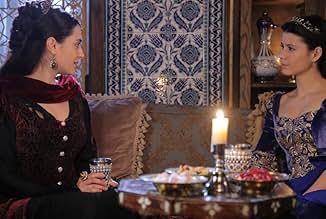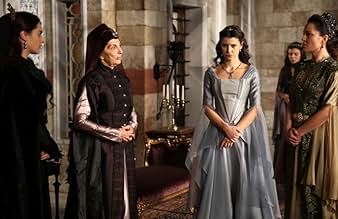Muhtesem Yüzyil: Kösem
- Série de TV
- 2015–2017
- 2 h
AVALIAÇÃO DA IMDb
6,6/10
4,2 mil
SUA AVALIAÇÃO
Adicionar um enredo no seu idiomaAnastasia a young Greek woman in Ahmed I's harem takes on the name 'Kosem' (leader, pioneer). In a world of men, she rules of the Ottoman Empire through her sons and grandson.Anastasia a young Greek woman in Ahmed I's harem takes on the name 'Kosem' (leader, pioneer). In a world of men, she rules of the Ottoman Empire through her sons and grandson.Anastasia a young Greek woman in Ahmed I's harem takes on the name 'Kosem' (leader, pioneer). In a world of men, she rules of the Ottoman Empire through her sons and grandson.
- Prêmios
- 2 vitórias no total
Explorar episódios
Enredo
Você sabia?
- CuriosidadesActress Anastasia Tsilimpiou ( young Kosem ) is greek, like her character in the series.
- ConexõesFollows Século Magnífico (2011)
- Trilhas sonorasKösem Opening Theme
Composed by Aytekin Atas
Avaliação em destaque
A beautiful series with wonderful supporting actors... and repulsive moral choices.
Pros:
By the production flaws I mean the following:
1. Video production is at the level of television series of the 90s. For example, imperfections in appearance are not masked by shooting angle or lights.
2. CGI. They constructed an entire set with luxurious chambers for filming, but clearly saved on heating the location. I feel sorry for the actors wearing négligée and talking with steam coming out of their mouths. The steam, background noise and other things should be removed in post-production.
3. The stunts lack realism and fail to entertain. During battles, the actors wave their arms so much that they actually would become slightly shorter after the first fight. Also, they use too much sloooooooooow mooooooootiooooooooon in each episode, especially in action scenes.
Cons:
Perhaps the plot carries some political overtones that are difficult for foreign viewers to see. Even if you focus only on the love story, watching the series is unpleasant and sometimes even painful. With so many deaths in the news last years, it's already too overwhelming to watch so much violence and hatred on screen. However, kudos to all the cast and crew who made the story watchable.
As an afterword, I'll note which people we have to feel for in the "Magnificent Century" franchise:
When the Sultan's Divan functioned as a law court for the trial of capital cases of such officials, it was usually without the knowledge of the offender. If he was found guilty an usher was sent with the court's decision and an order of death, which was given to the nearest official with power to put it into execution. The condemned man hurriedly settled his worldly affairs and made his peace with God, and was then quickly dispatched and his head cut off and brought back to the Sultan by the waiting usher, as proof that the deed had really been done. It has been said that as many as forty heads had been known to arrive at the court of Suleyman the Magnificent in the course of a single day. (Raphaela Lewis "Everyday Life in Ottoman Turkey")
Pros:
- Atmosphere. Despite its flaws (see below), the series successfully portrays the atmosphere and customs of an Ottoman harem. Personally, this made me interested in the era, so I started studying historical literature and watching documentaries.
- The supporting cast makes up for the mediocre performance of the main actors. However, it's hard to stay engaged in a drama when some actors are intense while others lack emotional depth.
- Costume design. The variety of appearances helps to remember dozens of characters in less than half a season. ;D
- Adaptation of some real events (borrowed from the biographies of various people like Roxelana, Nurbanu, Safiye and others).
- Budget. The crew's lack of experience for this project was compensated with money, in my humble opinion. The series was made in an expensive way, and despite production flaws, the picture looks good.
By the production flaws I mean the following:
1. Video production is at the level of television series of the 90s. For example, imperfections in appearance are not masked by shooting angle or lights.
2. CGI. They constructed an entire set with luxurious chambers for filming, but clearly saved on heating the location. I feel sorry for the actors wearing négligée and talking with steam coming out of their mouths. The steam, background noise and other things should be removed in post-production.
3. The stunts lack realism and fail to entertain. During battles, the actors wave their arms so much that they actually would become slightly shorter after the first fight. Also, they use too much sloooooooooow mooooooootiooooooooon in each episode, especially in action scenes.
Cons:
- Struggling to mix two genres. On the one hand, the series is a costume drama that focuses on harem intrigues instead of political games. On the other hand, the creators included a lot of violence in this work, making its rating suitable for viewers aged 18 and above. (In comparison, a good example of a harem costume drama without too much politics is "The Empress of China" (Wu Meiniang chuanqi, 2014). If you just want political intrigue and military strategy, then "The Three Kingdoms" (Sanguo, 2010) is beyond competition.) The more you watch, the more you understand why the subject caused such outrage in its homeland. You expect to see a historical series or at least a fairy tale. Instead, you get a disturbing story about maniacs who harm people and then act as if nothing happened. The worst thing is we have to empathize with these characters without questioning, because there's no reasonable explanation for so much blood other than Sultan's desire. In some situations, Ahmed personally executes criminals, in others he forgives and sets them free. Often these are identical events several episodes apart, involving the same characters!
- Constant repetition and characters with short-term memory. Episode by episode, scandals and intrigues go through a full cycle, then everything repeats all over again. The characters team up against their enemies, only to betray each other and join forces with enemies to defeat their friends. Even if someone hurts or kills a loved one of another character, enemies quickly forget about it and become allies.
- 0.01% of historical accuracy is the least of the problems, but still worthy of mention. The solutions found by the writers to escalate the drama are confusing. Concubines live in one room all the time, like in barracks. They frequently visit the Sultan in his personal chambers without asking in almost every episode. The ages of the characters and historical dates are incorrect, so many events could not have actually occurred. The characters behave in a completely different way from what is described in historical literature. Usually they make even worse decisions that their prototypes did. At least, in real life they could die from natural causes.
Perhaps the plot carries some political overtones that are difficult for foreign viewers to see. Even if you focus only on the love story, watching the series is unpleasant and sometimes even painful. With so many deaths in the news last years, it's already too overwhelming to watch so much violence and hatred on screen. However, kudos to all the cast and crew who made the story watchable.
As an afterword, I'll note which people we have to feel for in the "Magnificent Century" franchise:
When the Sultan's Divan functioned as a law court for the trial of capital cases of such officials, it was usually without the knowledge of the offender. If he was found guilty an usher was sent with the court's decision and an order of death, which was given to the nearest official with power to put it into execution. The condemned man hurriedly settled his worldly affairs and made his peace with God, and was then quickly dispatched and his head cut off and brought back to the Sultan by the waiting usher, as proof that the deed had really been done. It has been said that as many as forty heads had been known to arrive at the court of Suleyman the Magnificent in the course of a single day. (Raphaela Lewis "Everyday Life in Ottoman Turkey")
- saintmalkavian
- 3 de fev. de 2024
- Link permanente
Principais escolhas
Faça login para avaliar e ver a lista de recomendações personalizadas
- How many seasons does The Magnificent Century: Kosem have?Fornecido pela Alexa
Detalhes
- Data de lançamento
- País de origem
- Centrais de atendimento oficiais
- Idioma
- Também conhecido como
- The Magnificent Century: Kosem
- Locações de filme
- Empresa de produção
- Consulte mais créditos da empresa na IMDbPro
Contribua para esta página
Sugerir uma alteração ou adicionar conteúdo ausente

Principal brecha
What is the Brazilian Portuguese language plot outline for Muhtesem Yüzyil: Kösem (2015)?
Responda



























